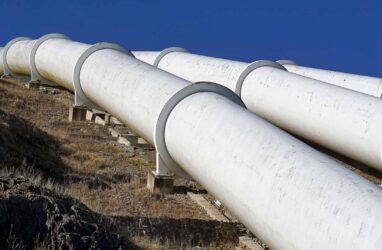Feed aggregator
Plastics in everyday objects may disrupt sleep in same way as caffeine, study finds
Findings show for first time how plastic chemicals throw off the body’s internal clock by up to 17 minutes
Chemicals in everyday plastics may disrupt the body’s natural 24-hour sleep-wake cycle and circadian rhythm in a way similar to coffee, which increases the risk of sleep disorders, diabetes, immune problems and cancer, new in vitro research shows.
The study looked at chemicals extracted from a PVC medical feeding tube and a polyurethane hydration pouch, like those used by long-distance runners. PVC and polyurethanes are also used in everything from kids toys to food packaging to furniture.
Continue reading...Gas-based ‘green’ steel uncompetitive in South Australia, think-tank urges hydrogen pivot
WWF report reveals impact of energy transition mineral extraction on Key Biodiversity Areas
Knowledge gaps hamper protection of boreal forests, UN says
Euro Markets: Midday Update
Technology developer launches carbon capture for shipping at $54/t cost
Uganda to set up national climate fund, undertake slew of measures to finance climate initiatives -official
VCM MONTHLY DATA: Carbon credit retirements underwhelm in April, CDR market breaks monthly record
CN Markets: CEAs plunge to 16-mth low, trading volumes stable after permit pre-allocation
Large share of EU ETS-financed fund revenues may go to unsustainable projects -NGO
Global initiative launches tool to unlock finance for NDCs
Carbon developer secures Europe’s first permit for onshore geological CO2 storage
INTERVIEW: Germany-funded project aims to lay groundwork for nature markets in EU forests
Midsummer butterflies spotted early in Britain after sunny spring
Scientists fear early emerging insects may fall out of sync with pathogens, predators or availability of food
Midsummer butterflies are on the wing in early May after a sunny spring prompted one of the most advanced seasons for Britain’s Lepidoptera on record.
The Lulworth skipper – usually found in June and July – is flying at Lulworth Cove in Dorset, the chequered skipper emerged in April rather than mid-May in Scotland and the first swallowtail, which is most common in mid-June, was spotted in Norfolk on 1 May.
Continue reading...European and British soils seriously degraded by intensive farming
Experts found 60% of the EU’s agricultural soils had been degraded, with about 40% similarly damaged in the UK
More than 60% of the EU’s agricultural soils are degraded due to intensive agriculture, with similar damage to about 40% of British soils, a report has found.
Experts from the Save Soil initiative said nourishing and restoring agricultural soils could reduce the impact of the climate crisis and provide protection against the worsening extremes of weather, as well as the food shortages and price rises likely to accompany them.
Continue reading...Australian voluntary cancellations rise in April as businesses await clarity on Climate Active
Video: Rising costs, vanishing moderates, and the race to net zero
The post Video: Rising costs, vanishing moderates, and the race to net zero appeared first on RenewEconomy.
Week in wildlife: A rare chameleon, friendly starlings and hot buffaloes
The best of this week’s wildlife photographs from around the world
Continue reading...NSW launches new tender for 1 GW of long duration storage, with longer timelines for pumped hydro
The post NSW launches new tender for 1 GW of long duration storage, with longer timelines for pumped hydro appeared first on RenewEconomy.
Renewables boss shocked by plunging price of battery storage, and soaring cost of a concrete slab
The post Renewables boss shocked by plunging price of battery storage, and soaring cost of a concrete slab appeared first on RenewEconomy.






